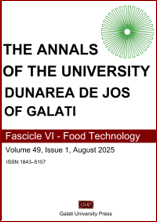Wild Rosmarinus officinalis L. extracts as a potent antioxidant agent
Abstract
In this work, was investigated the phytochemical composition and the antioxidant activity of extracts of rosemary collected from the natural site “Taoura”, situated in Souk-Ahras, North-Far-East area of Algeria. Two types of extracts were prepared, the first was the methanolic extract obtained by maceration of the aerial parts in methanol, and the second was the essential oil obtained by hydrodistillation using Clevenger device. The phytochemical analysis of the methanolic extract of rosemary revealed that it contained a relatively high phenolic content (168 mg GAE/g) and a strong antioxidant activity, as measured with the DPPH radical scavenging activity test. The yielded essential oil was analyzed by gaz chromatography-mass spectrometry. Forty-seven compounds representing 99.37% of the oil were identified. The oil consisted of oxygenated monoterpenic hydrocarbons, monoterpenes and sesquiterpene hydrocarbons. The main constituents of the oil were: 1,8-cineole (31.75%), camphor (18.94%) and a-pinene (11.13%). In addition, the DPPH radical scavenging activity of rosemary oil was investigated. The SC50 of rosemary essential oil was higher than it’s methanolic extract. The radical scavenging capacity of rosemary oil was 7.6 folds greater compared to the methanolic extract.


